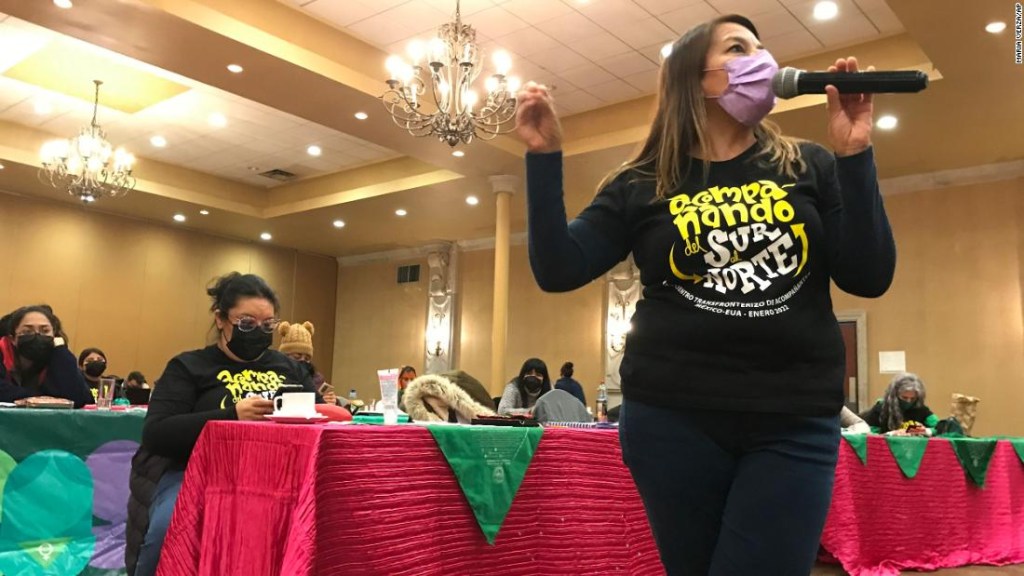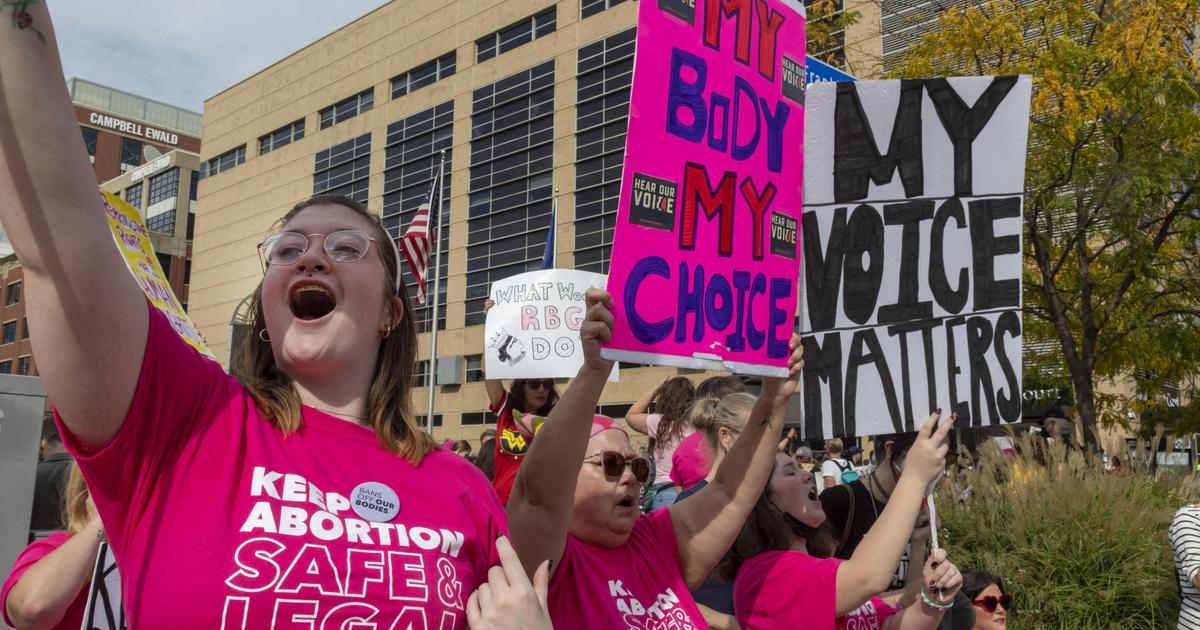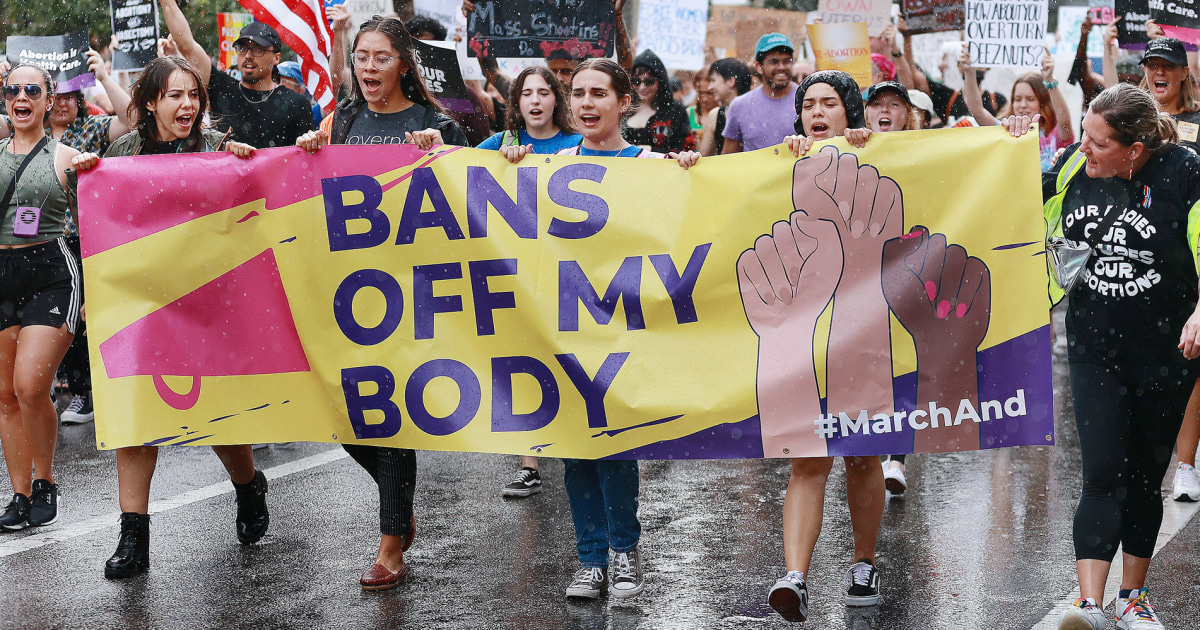(CNN) --
Veronica Cruz says she's been getting frantic calls from women in the United States.
Abortion clinics have canceled her appointments and are scared, she says.
"As soon as the Supreme Court decision came out, they were left without service. There are a lot of people calling us crying, very desperate," Cruz told CNN in a recent interview.
"And most don't even speak Spanish."
Cruz is the founder of Las Libres and has spent years fighting for the right to abortion in the Mexican state of Guanajuato and throughout the country.
Now her organization is helping lead a new battle, heeding calls from a growing number of women in the United States who are turning to Mexico for help.
Verónica Cruz, founder of Las Libres, speaks at a meeting of US and Mexican abortion rights advocates in January.
For decades, abortion rights advocates in Mexico looked to the United States as an example of what was possible.
The recent US Supreme Court ruling left many of them stunned, and determined to show their solidarity and take action.
Doctors are concerned that online misinformation is leading women to ineffective and dangerous abortion methods
In the last year there has been an exceptional change of roles.
In September 2021, the Mexican Supreme Court of Justice decriminalized abortion.
And in June 2022, the United States Supreme Court reversed Roe vs.
Wade, the historic 1973 ruling that guaranteed legal access to abortion throughout the country.
Women protest in front of the United States embassy in Mexico City following the decision of the United States Supreme Court to annul the Roe vs.
Wade.
"I was surprised that Mexico is going forward and the United States is going backwards," says Cruz.
"I never imagined it."
Cruz says she and other advocates in Mexico have been watching closely as a growing number of US states have passed restrictions on abortion.
And by the time the US Supreme Court decision came, she says, they were ready to help.
advertising
"A beautiful web is being woven so that women can have different options," says Sandra Cardona, who helps run "Red Need Abortar" from her home in Monterrey, Mexico.
Efforts by Mexican groups have focused for years on helping Mexican women obtain medical abortion pills and accompanying them through the process.
And now they say they are seeing a notable increase in requests for such aid from the United States.
The increase in calls from people addressed in English, Cruz says, is a sign of how great the need is.
"The numbers are going to keep growing," says Crystal P. Lira, founder of Bloodys Red Tijuana, another group that facilitates medical abortion.
"It's a cascading effect."
She traveled to the United States to have an abortion 10 years ago. She now she helps Americans get the same medicine
Crystal P. Lira says her organization is helping send medical abortion pills to women in the United States who need them.
Lira remembers how alone she felt when she crossed the US-Mexico border to visit a Planned Parenthood clinic a decade ago.
Back then, when she traveled from her home in Tijuana to San Diego to get medication for an abortion, pills were harder to come by in Mexico, and the stigma surrounding abortion was overwhelming.
"I left feeling very alone, feeling like I couldn't tell anyone else, not knowing who was going to support me," she says.
"I went in with many, many questions on my mind. It was a very confusing and lonely time."
Lira never imagined that one day she would be helping women in the United States obtain that same medication, while doing everything she could to promote access to abortion on both sides of the border and fight against the same stigma that she herself faced.
What is medical abortion and who has access to it?
Now the two pills required for medical abortion, mifepristone and misoprostol, are cheaper and easier to obtain in Mexico.
And activist networks in Mexico have stepped up efforts to ship the pills to the United States since the US Supreme Court ruling.
Misoprostol is one of two pills used for medical abortion.
The groups are also providing virtual support, known as accompaniment, to help women navigate the process from a distance.
It's important to remember, says Lira, that many women in the US are unable to travel to Mexico due to limited financial resources or lack of immigration documents.
"We are working to make sure that the medication reaches them," he says.
The groups that spoke to CNN declined to elaborate on how they are getting the drugs into the United States, saying they did not want to jeopardize the safety of the people they work with in the country.
The National Right to Life Committee, the largest anti-abortion group in the US, has suggested that states should expand criminal penalties for people who help a woman have an illegal abortion, including "trafficking" inducing drugs of abortion and even the provision of instructions on self-managed abortions.
In Texas, a 2021 law already prohibits the mailing of abortion medications and threatens jail time for those who supply the pills without being a doctor.
And legal experts say it's possible that lawmakers in some states will try to pass laws to prevent women from traveling out of state for abortions, like the bill introduced in Missouri earlier this year.
The day Roe vs.
Wade, listened to 70 US women.
For people in the US who can cross the border and prefer to travel to Mexico, Sandra Cardona says she and others will help them get medication and, if necessary, provide a safe place to take it.
Cardona and her partner converted the second floor of their Monterrey home into a space they call "Abortion."
Inside there are cozy rooms with sofas and posters that proclaim the importance of "free and dignified abortion."
Sandra Cardona's house, in Monterrey, Mexico, has become a space for accompanying medical abortion.
Women often come in scared, she says, but soon seem surprised by how easy the medical abortion process is.
"It usually lasts half a day. They take the first pill, mifepristone, 24 hours before coming to us, and then they take misoprostol. The process is very fast, between 3 and 4 hours, and that's it, they go home" Cardona says.
"When they come and see how fast it was and everything, they say, 'I would have done it at home.' Of course, there is pain, but we give them something for the pain. We are with them and we talk to them."
Recently, a woman working from home showed up with her laptop and kept working while her medication took effect.
Cardona says I Need Abortion Network started receiving more messages asking for help in September, after Texas enacted a sweeping law banning six-week abortions and allowing private citizens to file civil lawsuits against anyone who helps a pregnant person. to seek an abortion in violation of the ban.
What is the Texas abortion ban about and why is it important?
"Many women are afraid to do it there, because they fear they will be reported," she says.
That's one of the many reasons Cardona says she and her partner opened their home.
"Before September we received between 5 and 7 American women a month. After September, we received between 7 and 10 per week. On the day of the Supreme Court decision, we received 70 messages. And the thing has continued like this, without lowering the rhythm," he says.
Sandra Cardona and her colleague Vanessa Jiménez, of the I Need Abortion Network, say they have received a growing number of messages from women in the United States asking for help since the Supreme Court reversed Roe vs.
Wade.
Since the US Supreme Court decision, Cardona's efforts have received more publicity, and she says her group has received an increasing number of threatening messages, including from the US. But she says that won't stop her.
"Let them do what they want. We are going to continue accompanying [these women]. ... I am not going to be afraid of something that is not here," he says.
Abortion clinics are also preparing to receive more patients
Mexican groups facilitating access to medical abortions aren't the only ones seeing a change.
Even before Roe v.
Wade, the Profem, which runs abortion clinics in several cities in Mexico, treated some American patients.
In May, about 25% of patients seeking abortions at Profem's clinic in Tijuana were from the United States, says director Luisa García.
The demand for abortion providers is expected to increase in some states.
Doctors and nurses offer help on TikTok
"It's only been a short time, but yes, we are registering an increase," Garcia says, saying he expects the numbers to grow.
"It is something that I would never have believed, that from the United States they came to Mexico," he says.
"Before it was the other way around. (The United States was) a country with so many freedoms. It's something that I still have a hard time processing."
It is already common for some Americans to travel to Mexico for other medical procedures.
Traveling south of the border to visit abortion clinics could also become more common, Garcia says.
Marie Stopes International, an NGO that provides contraception and abortion services, opened a clinic in the Mexican border city of Tijuana just a week after the US Supreme Court decision.
Marie Stopes International this month opened a new clinic in Tijuana, Mexico.
A sign in the reception area displays the organization's motto: "Children by choice, not by chance."
“It was a coincidence,” says Araceli López Nava Vázquez, regional director for Latin America and national director for Mexico at Marie Stopes International Reproductive Choices, noting that it takes months of planning to open a new clinic.
Nava Vázquez says that Marie Stopes clinics in Mexico expect an increase in demand from patients from the United States, but so far they have not seen an increase.
She says the organization has recently been in talks with several groups in Arizona that are working to secure abortion access and travel funding.
She has also spoken with organizations in Texas.
"What I perceive is a lot of hopelessness, and it's really sad," he says.
"It's like we're back in the Middle Ages again."
Texas groups seem unsure about making plans, he says, with so much uncertainty about what will happen next in his state.
But she says that Marie Stopes is trying to do everything she can to help.
Officials in the Mexican capital have also said they are prepared to welcome any visitor from the United States who needs help with an abortion.
"We are a government of inclusion and we serve all people," Dr. Oliva López Arellano, Mexico City's health secretary, told reporters in May.
"They have the right to decide about their body. We have an obligation to protect their health."
This is how these organizations help women who reside in states where abortion is restricted
Mexican groups are sharing the lessons they have learned with their US counterparts
At a recent protest in Tucson, Arizona, supporters of the Mexican group Marea Verde Nogales wrote a message in chalk on the ground: "If you need an abortion, write to @mareaverdenogales."
Next to him, they drew a heart that said "USA Mexico Women United" inside.
And recently, the number of calls to the group from Arizona has increased, says member Bianca Valverde.
In addition to helping provide escort for medical abortions, the group hopes to help train advocates in the United States to provide escort for medical abortions using the same methods.
Despite the ruling of the Supreme Court of Justice of Mexico last year, the legal panorama of abortion in the country remains complex.
Mexico City and eight of the country's 31 states have decriminalized abortion, while other states continue to have laws criminalizing it.
About 80% of Mexicans identify as Catholic, and the Roman Catholic Church has organized anti-abortion protests.
A woman holds a cross as she takes part in an anti-abortion march in Mexico City in May.
Even in states where abortion is legal, providers have run into roadblocks, Garcia says.
His organization had difficulty finding a site for a new clinic in Tijuana earlier this year.
"We rented in a very famous medical office building that is dedicated to medical tourism," he said.
"The minute they found out it was for abortions, they didn't want to rent from us."
Mexico's abortion ruling could make waves beyond its borders
But abortion-rights advocates in Mexico say there's an important lesson they've learned in years of fighting the hurdles, a lesson they now seek to share with their counterparts north of the border.
Even in the most difficult times, they say, women can succeed if they help each other.
"Now is the time," says Cruz, "for the north to learn from the south."
-- David Shortell contributed to this report.









